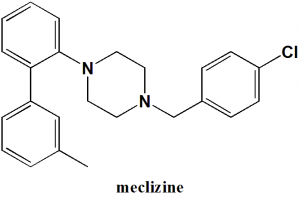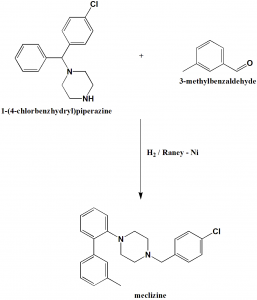MECLIZINE Synthesis, SAR, MCQ,Structure,Chemical Properties and Therapeutic Uses
Meclizine
IUPAC nomenclature
1-[(4-chlorophenyl)-phenylmethyl]-4-[(3-methylphenyl)methyl]piperazine
Classification
- H1-receptor antihistamine
- Piperazine antihistamine
Physiochemical Properties
| S. NO. | PHYSICAL AND CHEMICAL PROPERTIES | |
| 1 | Molecular weight | 390.9 g/mol |
| 2 | Physical appearance | Solid |
| 3 | Melting point | 217-224oC |
| 4 | Solubility | 0.1g/100ml |
| 5 | Octanol/water partition coefficient | 5.8 |
| 5 | Presence of ring | Piperazine, phenyl |
| 6 | Number of chiral centers | Not present |
Mechanism of Action
- Meclizine inhibits the signal transmission from the vestibular nuclei and NTS (nucleus of solitary tract) to the vomiting center and hemoreceptor trigger zone (CTZ) through antagonistic effects on H1 receptors.
- It also decreases the vestibular stimulation and labyrinth excitability.
Structure Activity Relationship
Structure activity of piperizine antihistamines can be summarized as:
- These are the derivatives of ethylene diamines.
- The connecting moiety is CHN group
- Primary structural difference is nature of para aromatic ring substituent
- These are moderately potent.
- Slow onset of action
- Low incidence of drowsiness
- They also exhibit peripheral and central antimuscarinic activity.
Method of synthesis
Reductive deamination of 3-methylbenzaldehyde with 1-(4-chlorbenzhydryl)piperazine using hydrogen over Raney nickel produces meclizine. [1]
Medicinal Uses
Meclizine is used for treatment of:
- Nausea
- Vomiting
- Dizziness
- Motion sickness
- Symptoms of vertigo
Side Effects
Side effects of Meclizine are:
- Drowsiness
- Vomiting
- Dry mouth
- Fatigue
- Headache
- Difficulty in breathing
- Swelling of face
MCQs
Q.1 “1-[(4-chlorophenyl)-phenylmethyl]-4-[(3-methylphenyl)methyl]piperazine” is the IUPAC nomenclature of which drug?
a) Loperamide
b) Meclizine
c) Buclizine
d) Lansoprazol
Q.2 Melting point of meclizine is?
a) 520oC
b) 217-224oC
c) 120oC
d) 25oC
Q.3 Match the following with correct classifications of the drugs.
| i. Meclizine | A. Analgesic |
| ii. Levorphanol | B. ß-blocker |
| iii. Atenolol | C. Anticonvulsant |
| iv.Phensuximide | D. H1-receptor antihistamine |
a) i-A, ii-D, iii-C, iv-B
b) i-D, ii-C, iii-A, iv-B
c) i-D, ii-A, iii-B, iv-C
d) i-B, ii-D, iii-A, iv-C
Q.4 Mechanism of action of Meclizine includes?
I. Antagonistic effects on H1-receptor.
II. Decrease in the vestibular stimulation and labyrinth excitability.
III. Inhibition of Hydrogen/Potassium pump
IV. Inhibition of COX-2 enzyme
a) I, II
b) II, IV
c) I, II, III
d) III
Q.5 Correct sequence for True and False for the given statements related with the SAR of Piperazine antihistamines can be?
- These are the derivatives of ethylene diamines.
- The connecting moiety is CHN group
- Primary structural difference is nature of para aromatic ring substituent
- These are moderately potent
a) TTFT
b) TFTF
c) TTTT
d) FTTT
Q.6 Reductive deamination of 3-methylbenzaldehyde with 1-(4-chlorbenzhydryl)piperazine using hydrogen over Raney nickel produces which drug?
a) Methotrexate
b) Omeprazol
c) Meclizine
d) Carbinoxamine
Q.7 The drug Meclizine is mainly used for treatment of?
a) Nausea
b) Dizziness
c) Symptoms of vertigo
d) All of the above
Participate in Online FREE GPAT TEST: CLICK HERE
Participate in Online FREE Pharmacist TEST: CLICK HERE
Participate in Online FREE Drug Inspector TEST: CLICK HERE
Participate in CSIR NET JRF Mock Test
ANSWERS
1-b
2-b
3-c
4-b
5-c
6-c
7-d
REFERENCES
[1] Vardanyan R, Hruby V. Synthesis of essential drugs. Elsevier; 2006 Mar 10.

